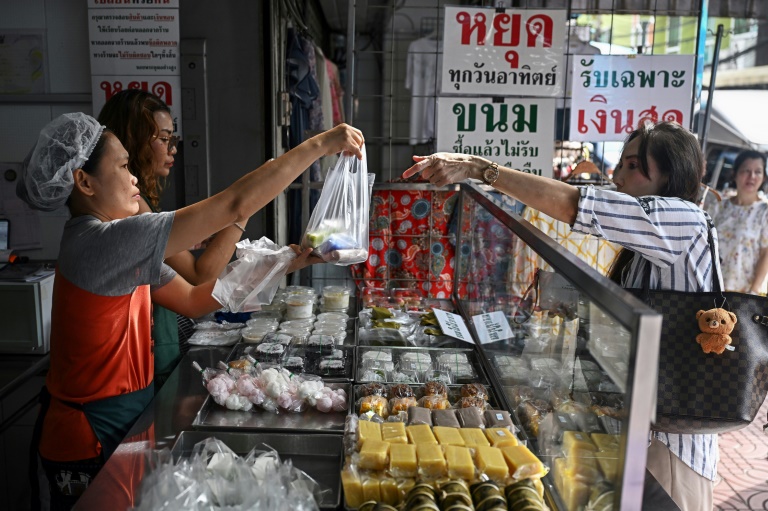Each year the world produces around 400 million tonnes of plastic waste, much of it discarded after just a few minutes of use.
Negotiators hope to reach the world’s first treaty on plastic pollution this year, but across five very different countries, AFP found single-use plastic remains hugely popular as a cheap and convenient choice, illustrating the challenges ahead:
Bangkok
On a Bangkok street lined with food vendors, customers line up for Maliwan’s famed traditional sweets.
Steamed layer cakes — green with pandan leaf or blue with butterfly pea — sit in clear plastic bags alongside rows of taro pudding in plastic boxes.
Each day, the 40-year-old business uses at least two kilos of single-use plastic.
“Plastic is easy, convenient and cheap,” said 44-year-old owner Watchararas Tamrongpattarakit.
Banana leaves used to be standard, but they are increasingly expensive and hard to source.
They are also onerous to use because each one must be cleaned and checked for tears.
It “isn’t practical for our pace of sales”, said Watchararas.
Thailand started limiting single-use plastic before the pandemic, asking major retailers to stop handing out bags for free.
But the policy has largely fallen by the wayside, with little uptake among the country’s street food vendors.
Thailand produces two million tons of plastic waste a year, according to the country’s Pollution Control Department.
The World Bank estimates 11 percent goes uncollected, and is burned, disposed of on land or leaks into rivers and the ocean.
Watchararas tries to consolidate purchases into fewer bags and said some customers bring their own reusable containers and totes.
But Radeerut Sakulpongpaisal, a Maliwan customer for 30 years, said she finds plastic “convenient”.
“I also understand the environmental impact,” the bank worker said.
But “it’s probably easier for both the shop and the customers”.
Lagos
In the Obalende market at the heart of Nigeria’s economic capital Lagos, emptied water sachets litter the ground.
Each day, Lisebeth Ajayi watches dozens of customers use their teeth to tear open the bags of “pure water” and drink.
“They don’t have the money to buy the bottle water, that’s why they do the pure water,” said the 58-year-old, who sells bottles and bags of water, soap and sponges.
Two 500-millilitre sachets sell for between 50 to 250 naira (3-15 US cents), compared to 250-300 naira for a 750-ml bottle.
Since they appeared in the 1990s, water sachets have become a major pollutant across much of Africa, but…
Click Here to Read the Full Original Article at Yahoo News – Latest News & Headlines…

